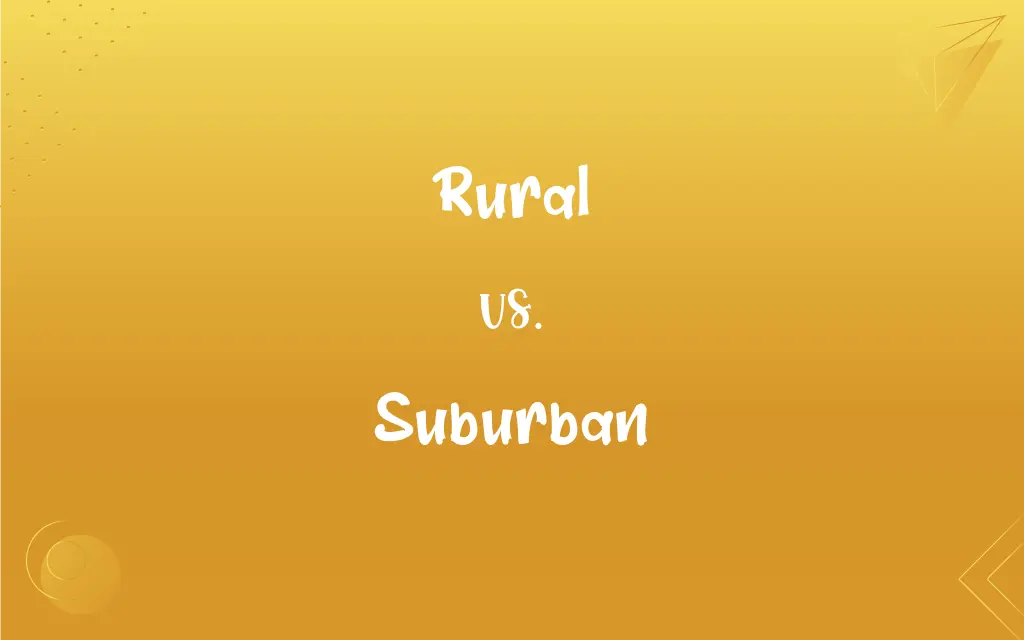Rural vs. Suburban: What's the Difference?
Edited by Janet White || By Harlon Moss || Updated on June 7, 2024
Rural refers to countryside areas; suburban pertains to areas on the outskirts of a city.

Key Differences
Rural areas often present vast open spaces, typically showcasing large fields, farmland, and fewer built structures. Suburban regions, while they might also offer open spaces, usually have more developed facilities, residential areas, and are located on the outskirts of urban cities.
In the rural context, populations tend to be sparse, and inhabitants often engage in agricultural or other primary sector activities. The suburban context is characterized by denser populations, with many people commuting to work in nearby cities, maintaining a bridge between urban and rural lifestyles.
Rural areas tend to have a slower pace of life, with communities that are often closely-knit and where everyone knows each other. In contrast, suburban areas might offer a quicker pace, akin to cities, with a blend of residential comfort and urban facilities, ensuring residents do not lack modern conveniences.
While rural zones may sometimes lack immediate access to amenities and services due to their remote nature, suburban locales usually boast better access to such services, due to their proximity to urban centers, offering a comfortable blend of urban functionality and semi-rural serenity.
Education and healthcare facilities in rural areas might be limited or located at a considerable distance, potentially posing accessibility issues. Conversely, suburban areas, being closer to urban centers, tend to have more, and often better, access to such essential services and educational institutions.
ADVERTISEMENT
Comparison Chart
Population Density
Typically sparse
Relatively denser
Primary Activities
Often agricultural or primary sector
Varied, with many commuting to cities
Pace of Life
Generally slower and closely-knit
Quicker, akin to urban areas
Access to Amenities
May lack immediate access
Better access due to proximity to cities
Infrastructure
Limited infrastructure and services
More developed infrastructure and services
ADVERTISEMENT
Rural and Suburban Definitions
Rural
Distant from urban centers.
Living in a rural area means a long commute to the city.
Suburban
Accessible amenities and services.
Suburban residents enjoy accessible schools and hospitals.
Rural
Limited access to amenities and services.
Rural residents often travel far for healthcare and shopping.
Suburban
Characterized by residential and commercial zones.
Suburban areas often feature malls and residential developments.
Rural
Pertaining to the countryside.
The rural landscape was serene and expansive.
Suburban
Commuting lifestyle prevalent.
Suburban living often involves commuting to the city for work.
Rural
Sparsely populated with open spaces.
She enjoyed the peace found in rural settings.
Suburban
Pertaining to areas on a city's outskirts.
The suburban neighborhood was peaceful yet close to the city.
Rural
Characterized by agriculture or farming.
Rural areas typically host numerous farms and pastures.
Suburban
Moderate population density.
Suburban locales offer a balance of space and community.
Rural
Of, relating to, or characteristic of the country.
Suburban
Of, relating to, or characteristic of a suburb.
Rural
Of or relating to people who live in the country
Rural households.
Suburban
Located or residing in a suburb.
Rural
Of or relating to farming; agricultural.
Suburban
Of, relating to, or characteristic of the culture, customs, and manners typical of life in the suburbs.
Rural
Relating to the countryside or to agriculture.
Suburban
A suburbanite.
Rural
(obsolete) A person from the countryside; a rustic.
Suburban
Relating to or characteristic of or situated on the outskirts of a city.
Rural
Of or pertaining to the country, as distinguished from a city or town; living in the country; suitable for, or resembling, the country; rustic; as, rural scenes; a rural prospect.
Here is a rural fellow; . . . He brings you figs.
Suburban
A person who lives in a suburb.
Rural
Of or pertaining to agriculture; as, rural economy.
We turnTo where the silver Thames first rural grows.
Lay bashfulness, that rustic virtue, by;To manly confidence thy throughts apply.
Suburban
An automobile with a station wagon body on a truck chassis.
Rural
Living in or characteristic of farming or country life;
Rural people
Large rural households
Unpaved rural roads
An economy that is basically rural
Suburban
Of or pertaining to suburbs; inhabiting, or being in, the suburbs of a city.
Suburban villas, highway-side retreats, . . . Delight the citizen.
Rural
Relating to rural areas;
Rural electrification
Rural free delivery (RFD)
Suburban
One who dwells in the suburbs.
Suburban
Relating to or characteristic of or situated in suburbs;
Surburban population
FAQs
What defines a suburban area?
A suburban area is a residential locale typically situated on the outskirts of a city, blending aspects of urban and rural environments.
Are amenities more accessible in suburban or rural areas?
Amenities are generally more accessible in suburban areas due to their proximity to cities.
What is a rural area?
A rural area is a region characterized by open spaces, often linked with farming and sparse populations.
How is healthcare accessibility in rural vs. suburban areas?
Healthcare is often more accessible in suburban areas, while rural areas may lack immediate access to medical facilities.
Are suburban areas characterized by a blend of lifestyles?
Yes, suburban areas merge aspects of both urban and rural lifestyles, offering a blend of opportunities and conveniences from both.
What is the typical lifestyle in rural areas?
Rural areas often involve a slower pace of life, with a significant involvement in agricultural activities.
How does population density in rural and suburban areas differ?
Rural areas tend to have sparser populations, while suburban areas exhibit denser populations.
What kind of businesses predominate in suburban areas?
Suburban areas often host a variety of businesses, including retail, dining, and service-oriented enterprises.
Can one find high-tech industries in rural areas?
High-tech industries are typically rarer in rural areas compared to suburban or urban regions.
Are schools typically far from homes in rural areas?
Schools in rural areas can be far from homes due to sparse populations and vast open spaces.
Are suburban areas always located outside cities?
Suburban areas are typically located on the outskirts of cities, offering a middle ground between urban and rural living.
Are there shopping malls in rural areas?
Rural areas typically have fewer shopping centers and malls compared to suburban areas.
How is transportation in suburban areas?
Suburban areas generally offer better transportation links and accessibility to urban centers.
Is it common to find manufacturing units in rural areas?
Some rural areas might host manufacturing units, particularly those related to agricultural production.
Can suburban areas also have open spaces?
Yes, suburban areas can offer open spaces, parks, and recreational areas while being proximate to urban facilities.
How are housing structures different in suburban areas?
Housing in suburban areas often combines residential comfort with closer neighbors and communities compared to rural settings.
How are social interactions in suburban areas?
Suburban areas often facilitate social interactions due to denser populations, schools, and social amenities.
Can rural areas be near cities?
While rural areas can be near cities, they are characterized by open spaces, lower population densities, and often a focus on agriculture.
What is the typical occupation in rural areas?
Occupations in rural areas often revolve around farming, although not exclusively.
What is the main allure of suburban living?
Suburban living offers a blend of residential tranquility and access to urban amenities and opportunities.
About Author
Written by
Harlon MossHarlon is a seasoned quality moderator and accomplished content writer for Difference Wiki. An alumnus of the prestigious University of California, he earned his degree in Computer Science. Leveraging his academic background, Harlon brings a meticulous and informed perspective to his work, ensuring content accuracy and excellence.
Edited by
Janet WhiteJanet White has been an esteemed writer and blogger for Difference Wiki. Holding a Master's degree in Science and Medical Journalism from the prestigious Boston University, she has consistently demonstrated her expertise and passion for her field. When she's not immersed in her work, Janet relishes her time exercising, delving into a good book, and cherishing moments with friends and family.







































































